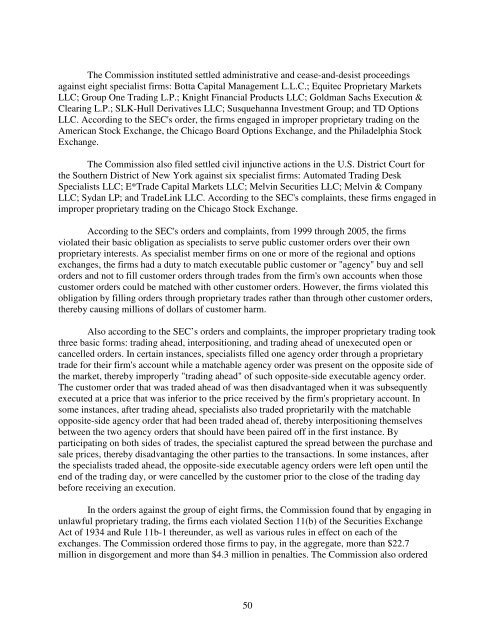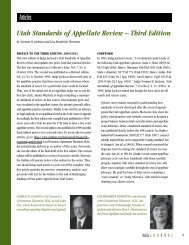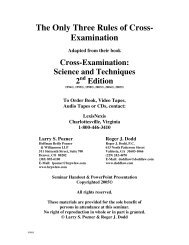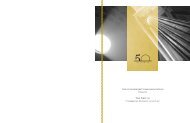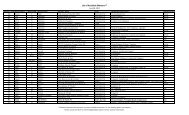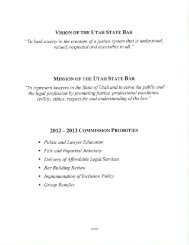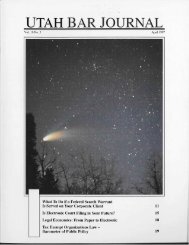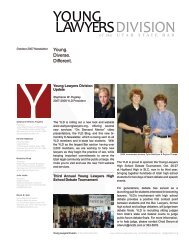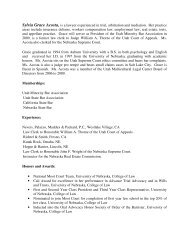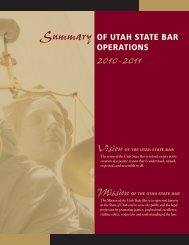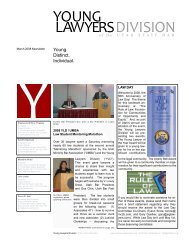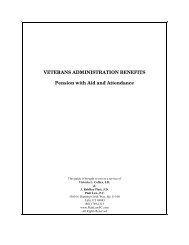Outline of Recent SEC Enforcement Actions - the Utah State Bar
Outline of Recent SEC Enforcement Actions - the Utah State Bar
Outline of Recent SEC Enforcement Actions - the Utah State Bar
Create successful ePaper yourself
Turn your PDF publications into a flip-book with our unique Google optimized e-Paper software.
The Commission instituted settled administrative and cease-and-desist proceedings<br />
against eight specialist firms: Botta Capital Management L.L.C.; Equitec Proprietary Markets<br />
LLC; Group One Trading L.P.; Knight Financial Products LLC; Goldman Sachs Execution &<br />
Clearing L.P.; SLK-Hull Derivatives LLC; Susquehanna Investment Group; and TD Options<br />
LLC. According to <strong>the</strong> <strong>SEC</strong>'s order, <strong>the</strong> firms engaged in improper proprietary trading on <strong>the</strong><br />
American Stock Exchange, <strong>the</strong> Chicago Board Options Exchange, and <strong>the</strong> Philadelphia Stock<br />
Exchange.<br />
The Commission also filed settled civil injunctive actions in <strong>the</strong> U.S. District Court for<br />
<strong>the</strong> Sou<strong>the</strong>rn District <strong>of</strong> New York against six specialist firms: Automated Trading Desk<br />
Specialists LLC; E*Trade Capital Markets LLC; Melvin Securities LLC; Melvin & Company<br />
LLC; Sydan LP; and TradeLink LLC. According to <strong>the</strong> <strong>SEC</strong>'s complaints, <strong>the</strong>se firms engaged in<br />
improper proprietary trading on <strong>the</strong> Chicago Stock Exchange.<br />
According to <strong>the</strong> <strong>SEC</strong>'s orders and complaints, from 1999 through 2005, <strong>the</strong> firms<br />
violated <strong>the</strong>ir basic obligation as specialists to serve public customer orders over <strong>the</strong>ir own<br />
proprietary interests. As specialist member firms on one or more <strong>of</strong> <strong>the</strong> regional and options<br />
exchanges, <strong>the</strong> firms had a duty to match executable public customer or "agency" buy and sell<br />
orders and not to fill customer orders through trades from <strong>the</strong> firm's own accounts when those<br />
customer orders could be matched with o<strong>the</strong>r customer orders. However, <strong>the</strong> firms violated this<br />
obligation by filling orders through proprietary trades ra<strong>the</strong>r than through o<strong>the</strong>r customer orders,<br />
<strong>the</strong>reby causing millions <strong>of</strong> dollars <strong>of</strong> customer harm.<br />
Also according to <strong>the</strong> <strong>SEC</strong>’s orders and complaints, <strong>the</strong> improper proprietary trading took<br />
three basic forms: trading ahead, interpositioning, and trading ahead <strong>of</strong> unexecuted open or<br />
cancelled orders. In certain instances, specialists filled one agency order through a proprietary<br />
trade for <strong>the</strong>ir firm's account while a matchable agency order was present on <strong>the</strong> opposite side <strong>of</strong><br />
<strong>the</strong> market, <strong>the</strong>reby improperly "trading ahead" <strong>of</strong> such opposite-side executable agency order.<br />
The customer order that was traded ahead <strong>of</strong> was <strong>the</strong>n disadvantaged when it was subsequently<br />
executed at a price that was inferior to <strong>the</strong> price received by <strong>the</strong> firm's proprietary account. In<br />
some instances, after trading ahead, specialists also traded proprietarily with <strong>the</strong> matchable<br />
opposite-side agency order that had been traded ahead <strong>of</strong>, <strong>the</strong>reby interpositioning <strong>the</strong>mselves<br />
between <strong>the</strong> two agency orders that should have been paired <strong>of</strong>f in <strong>the</strong> first instance. By<br />
participating on both sides <strong>of</strong> trades, <strong>the</strong> specialist captured <strong>the</strong> spread between <strong>the</strong> purchase and<br />
sale prices, <strong>the</strong>reby disadvantaging <strong>the</strong> o<strong>the</strong>r parties to <strong>the</strong> transactions. In some instances, after<br />
<strong>the</strong> specialists traded ahead, <strong>the</strong> opposite-side executable agency orders were left open until <strong>the</strong><br />
end <strong>of</strong> <strong>the</strong> trading day, or were cancelled by <strong>the</strong> customer prior to <strong>the</strong> close <strong>of</strong> <strong>the</strong> trading day<br />
before receiving an execution.<br />
In <strong>the</strong> orders against <strong>the</strong> group <strong>of</strong> eight firms, <strong>the</strong> Commission found that by engaging in<br />
unlawful proprietary trading, <strong>the</strong> firms each violated Section 11(b) <strong>of</strong> <strong>the</strong> Securities Exchange<br />
Act <strong>of</strong> 1934 and Rule 11b-1 <strong>the</strong>reunder, as well as various rules in effect on each <strong>of</strong> <strong>the</strong><br />
exchanges. The Commission ordered those firms to pay, in <strong>the</strong> aggregate, more than $22.7<br />
million in disgorgement and more than $4.3 million in penalties. The Commission also ordered<br />
50


